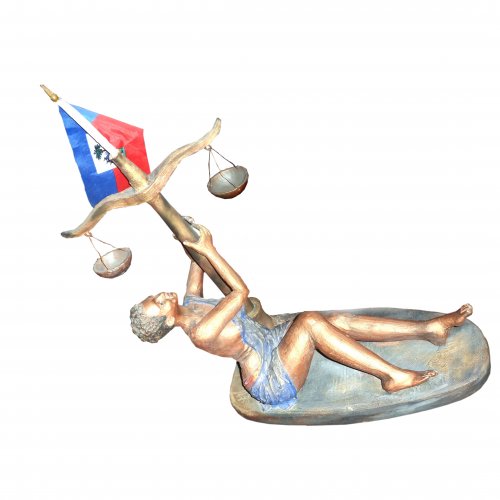Best Financial Services Regulation Lawyers in Port-au-Prince
Share your needs with us, get contacted by law firms.
Free. Takes 2 min.
List of the best lawyers in Port-au-Prince, Haiti
About Financial Services Regulation Law in Port-au-Prince, Haiti
Financial services regulation in Port-au-Prince, Haiti, is designed to oversee and control financial institutions and markets, ensuring stability, integrity, and protection for consumers. The regulatory framework is primarily governed by the country's central bank, the Banque de la République d'Haïti (BRH), alongside other governmental bodies. Regulations cover various areas including banking, insurance, microfinance, and securities, aimed at promoting transparency, confidence, and efficiency in the financial system.
Why You May Need a Lawyer
There are several situations where you might need a lawyer in the field of financial services regulation:
- Compliance Issues: Navigating the complex landscape of financial regulations to ensure your business complies with current laws.
- Licensing and Registration: Assistance in obtaining the necessary licenses and registrations to operate legally within the financial sector.
- Dispute Resolution: Legal support in resolving disputes with clients, regulatory bodies, or financial institutions.
- Transaction Facilitation: Guidance on significant transactions, mergers, or acquisitions that require regulatory approval.
- Financial Fraud Defense: Representation in case of allegations of financial misconduct or fraud.
Local Laws Overview
Understanding the local legal environment is crucial for navigating financial services regulation in Port-au-Prince. Key aspects include:
- The Central Bank Law: Regulates monetary policy, the banking sector, and issuance of financial licenses.
- Anti-Money Laundering (AML) Regulations: Mandates compliance measures to combat money laundering and terrorist financing.
- Consumer Protection Laws: Ensure fair treatment of consumers in the financial sector.
- Microfinance Regulation: Specific laws-based regulation of microcredit institutions to support small and medium-sized enterprises.
Frequently Asked Questions
What is the role of the BRH in financial regulation?
The Banque de la République d'Haïti (BRH) is the main regulatory authority responsible for overseeing monetary policy, ensuring financial stability, and supervising banks and their operations.
What licenses are needed to open a bank in Port-au-Prince?
To open a bank, you must obtain a banking license from the BRH, which involves a stringent review process to ensure compliance with national standards.
How can I report a potential case of financial fraud?
Reports of financial fraud can be submitted to the BRH's financial crime investigation unit or through relevant law enforcement agencies.
What penalties are imposed for non-compliance with AML regulations?
Penalties can range from fines to revocation of operating licenses and potential criminal charges against responsible parties.
Are there specific consumer protection measures in the financial sector?
Yes, there are specific legal frameworks that protect consumers from unfair practices, ensuring transparency and accountability in financial services.
What legal recourse do I have in a dispute with my bank?
Legal recourse may involve mediation, arbitration, or judicial proceedings, depending on the nature of the dispute and the terms of your agreement with the bank.
What is the importance of microfinance regulation?
Microfinance regulation is crucial for providing financial inclusion and support to small enterprises and individuals who lack access to traditional banking services.
How often must financial institutions report to the BRH?
Financial institutions are typically required to submit regular reports to the BRH, usually on a quarterly and annual basis, depending on the type of institution.
Can foreign investors freely operate financial businesses in Haiti?
Foreign investors must adhere to the same regulations as domestic entities and often require additional approvals from relevant authorities.
What expertise should a lawyer specializing in financial services regulation have?
A lawyer should have expertise in local and international finance laws, along with experience in compliance, licensing, and legal dispute resolution within the financial sector.
Additional Resources
For more assistance and resources, consider reaching out to the following:
- Banque de la République d'Haïti (BRH): Offers resources on guidelines, regulations, and reporting standards for financial entities.
- Ministry of Economy and Finance: Provides information on economic policies and financial legislation.
- Haiti Financial Intelligence Unit (UCREF): Monitors financial transactions to prevent money laundering.
Next Steps
If you need legal assistance in financial services regulation, consider these steps:
- Research: Learn about the specific area of financial regulation that pertains to your situation.
- Consultation: Schedule a consultation with a lawyer specializing in financial services regulation in Haiti.
- Documentation: Gather all relevant documents and records to present during your consultation to provide a comprehensive view of your needs.
- Engagement: Engage a lawyer for tailored advice and representation in your financial matters. Ensure they have a good understanding of local laws and regulations.
Lawzana helps you find the best lawyers and law firms in Port-au-Prince through a curated and pre-screened list of qualified legal professionals. Our platform offers rankings and detailed profiles of attorneys and law firms, allowing you to compare based on practice areas, including Financial Services Regulation, experience, and client feedback.
Each profile includes a description of the firm's areas of practice, client reviews, team members and partners, year of establishment, spoken languages, office locations, contact information, social media presence, and any published articles or resources. Most firms on our platform speak English and are experienced in both local and international legal matters.
Get a quote from top-rated law firms in Port-au-Prince, Haiti — quickly, securely, and without unnecessary hassle.
Disclaimer:
The information provided on this page is for general informational purposes only and does not constitute legal advice. While we strive to ensure the accuracy and relevance of the content, legal information may change over time, and interpretations of the law can vary. You should always consult with a qualified legal professional for advice specific to your situation.
We disclaim all liability for actions taken or not taken based on the content of this page. If you believe any information is incorrect or outdated, please contact us, and we will review and update it where appropriate.








